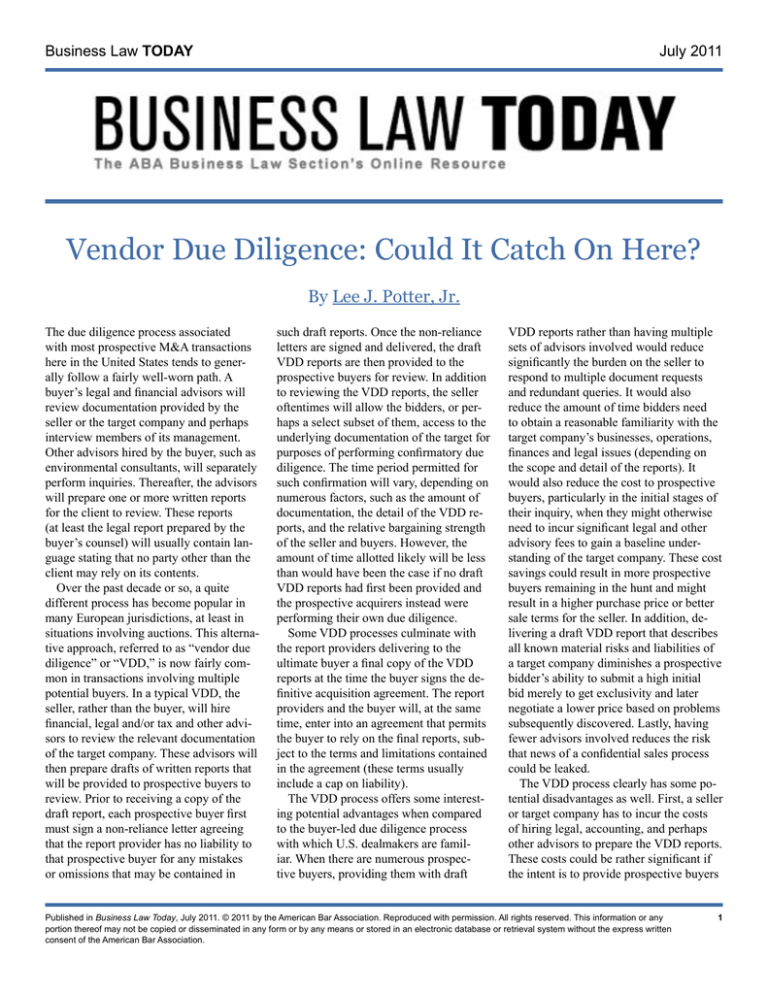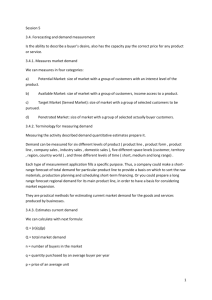
Business Law Today
July 2011
Vendor Due Diligence: Could It Catch On Here?
By Lee J. Potter, Jr.
The due diligence process associated
with most prospective M&A transactions
here in the United States tends to generally follow a fairly well-worn path. A
buyer’s legal and financial advisors will
review documentation provided by the
seller or the target company and perhaps
interview members of its management.
Other advisors hired by the buyer, such as
environmental consultants, will separately
perform inquiries. Thereafter, the advisors
will prepare one or more written reports
for the client to review. These reports
(at least the legal report prepared by the
buyer’s counsel) will usually contain language stating that no party other than the
client may rely on its contents.
Over the past decade or so, a quite
different process has become popular in
many European jurisdictions, at least in
situations involving auctions. This alternative approach, referred to as “vendor due
diligence” or “VDD,” is now fairly common in transactions involving multiple
potential buyers. In a typical VDD, the
seller, rather than the buyer, will hire
financial, legal and/or tax and other advisors to review the relevant documentation
of the target company. These advisors will
then prepare drafts of written reports that
will be provided to prospective buyers to
review. Prior to receiving a copy of the
draft report, each prospective buyer first
must sign a non-reliance letter agreeing
that the report provider has no liability to
that prospective buyer for any mistakes
or omissions that may be contained in
such draft reports. Once the non-reliance
letters are signed and delivered, the draft
VDD reports are then provided to the
prospective buyers for review. In addition
to reviewing the VDD reports, the seller
oftentimes will allow the bidders, or perhaps a select subset of them, access to the
underlying documentation of the target for
purposes of performing confirmatory due
diligence. The time period permitted for
such confirmation will vary, depending on
numerous factors, such as the amount of
documentation, the detail of the VDD reports, and the relative bargaining strength
of the seller and buyers. However, the
amount of time allotted likely will be less
than would have been the case if no draft
VDD reports had first been provided and
the prospective acquirers instead were
performing their own due diligence.
Some VDD processes culminate with
the report providers delivering to the
ultimate buyer a final copy of the VDD
reports at the time the buyer signs the definitive acquisition agreement. The report
providers and the buyer will, at the same
time, enter into an agreement that permits
the buyer to rely on the final reports, subject to the terms and limitations contained
in the agreement (these terms usually
include a cap on liability).
The VDD process offers some interesting potential advantages when compared
to the buyer-led due diligence process
with which U.S. dealmakers are familiar. When there are numerous prospective buyers, providing them with draft
VDD reports rather than having multiple
sets of advisors involved would reduce
significantly the burden on the seller to
respond to multiple document requests
and redundant queries. It would also
reduce the amount of time bidders need
to obtain a reasonable familiarity with the
target company’s businesses, operations,
finances and legal issues (depending on
the scope and detail of the reports). It
would also reduce the cost to prospective
buyers, particularly in the initial stages of
their inquiry, when they might otherwise
need to incur significant legal and other
advisory fees to gain a baseline understanding of the target company. These cost
savings could result in more prospective
buyers remaining in the hunt and might
result in a higher purchase price or better
sale terms for the seller. In addition, delivering a draft VDD report that describes
all known material risks and liabilities of
a target company diminishes a prospective
bidder’s ability to submit a high initial
bid merely to get exclusivity and later
negotiate a lower price based on problems
subsequently discovered. Lastly, having
fewer advisors involved reduces the risk
that news of a confidential sales process
could be leaked.
The VDD process clearly has some potential disadvantages as well. First, a seller
or target company has to incur the costs
of hiring legal, accounting, and perhaps
other advisors to prepare the VDD reports.
These costs could be rather significant if
the intent is to provide prospective buyers
Published in Business Law Today, July 2011. © 2011 by the American Bar Association. Reproduced with permission. All rights reserved. This information or any
portion thereof may not be copied or disseminated in any form or by any means or stored in an electronic database or retrieval system without the express written
consent of the American Bar Association.
1
Business Law Today
with reasonably comprehensive reports
covering most or all material aspects of
the target’s businesses, finances, operations, and liabilities. (If the reports are not
comprehensive, prospective buyers will
reasonably assert that they will need to
undertake additional due diligence to fill
in the gaps.) Secondly, a buyer may be
reluctant to place sole or primary reliance
on the contents of the reports, as they
are prepared by advisors for the seller,
rather than its own advisors. Thirdly, the
information in the reports would usually
be presented in a very dry and stiff format,
with little or none of the insight, advice,
or recommendations that a buyer might
expect from a report prepared by its own
advisors. Lastly, VDD may pose some
vexing issues for U.S. law firms involved
in such projects.
A U.S. law firm that is invited to participate in a multi-country VDD needs
to understand up front the contemplated
process and the expectations of the parties, and carefully assess its risk exposure.
It is not customary for an American law
firm to permit a non-client to rely on
a report prepared by it. Most U.S. law
firms will not permit a non-client even
to see its due diligence report unless the
non-client first signs a letter agreeing
that it may not rely on its contents. This
practice presumably results from liability
concerns—malpractice claims against law
firms are more commonplace here in the
United States than elsewhere. Moreover,
ethics rules applicable to lawyers in the
United States disallow them from capping
July 2011
or otherwise limiting the amount of their
liability for malpractice. A U.S. law firm
that contractually permitted a buyer to rely
on its due diligence report therefore would
be liable, without any limitation, for any
losses incurred by the buyer that result
from mistakes or omissions contained in
its report. Moreover, when preparing the
report, the law firm would not yet know
the identity of the ultimate buyer, and thus
would not have an understanding of that
buyer’s particular concerns or focuses.
It is difficult to envision a law firm here
in the United States agreeing to such an
arrangement.
Therefore, before an American lawyer
accepts a VDD engagement, he or she
should have a clear understanding of the
anticipated process, including whether the
lead law firm or office (which may be a
separate firm in the country of the seller
or perhaps a foreign office of the same
firm) will be required to deliver a reliance
letter to the ultimate buyer, and whether
the U.S. firm or office is itself expected to
also deliver such a letter. A process that
contemplates the U.S. firm itself affirmatively agreeing to permit reliance on its
VDD report by the buyer may prove to
be too unpalatable for the firm to accept.
Alternatively, the foreign lead law firm
may decide to include the U.S. information within its own VDD report, under its
own name. This approach affords the U.S.
firm at least a possibility that any dispute
over U.S.-related information in the report
would take place between the lead firm
and the buyer, with the U.S. firm remain-
ing in the background (albeit with liability
over to the lead firm as its subcontractor),
and that any resulting liability would be
subject to the agreed-upon cap. However, even if the U.S. firm has no direct
contact with the buyer, the buyer might
nonetheless decide to file a malpractice
claim directly against the U.S. firm in an
American court. Such a claim would not
be subject to any contractual cap, as (1)
malpractice is a tort, not a contract-based
claim, and (2) applicable ethics rules in
the U.S. disallow lawyers from capping
their liability in the terms of their engagements.
Because of the differences in the U.S.
legal system versus those of European
countries, VDD, at least in its most fulsome form that permits buyer reliance on
the final reports, is not likely to become
popular here in the United States. Even so,
U.S. lawyers need to be somewhat familiar with this growing European practice,
in order to properly address potentially
problematic issues that could arise should
they be invited to participate in such a
project.
Lee J. Potter, Jr. is a partner in the
Corporate Practice Group of Duane
Morris LLP in New York.
Published in Business Law Today, July 2011. © 2011 by the American Bar Association. Reproduced with permission. All rights reserved. This information or any
portion thereof may not be copied or disseminated in any form or by any means or stored in an electronic database or retrieval system without the express written
consent of the American Bar Association.
2







